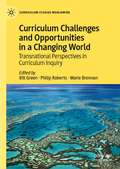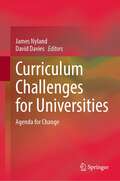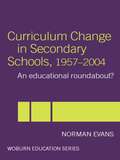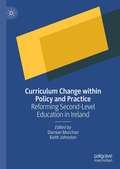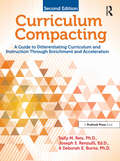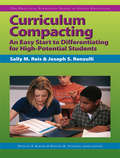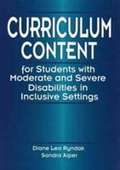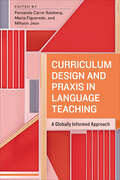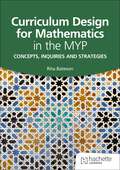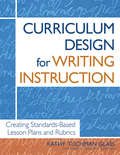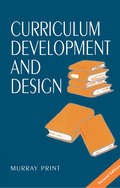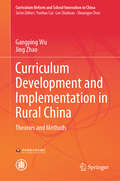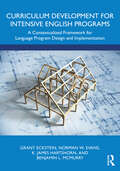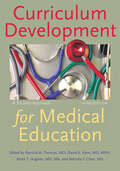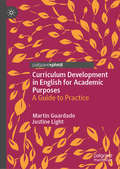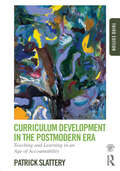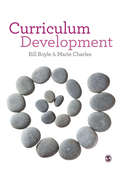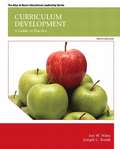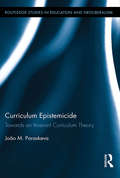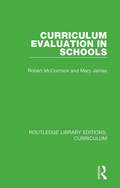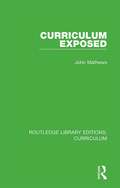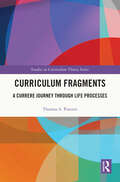- Table View
- List View
Curriculum Challenges and Opportunities in a Changing World: Transnational Perspectives in Curriculum Inquiry (Curriculum Studies Worldwide)
by Marie Brennan Bill Green Philip RobertsThis book brings together voices and perspectives from across the world and draws in a new generation of curriculum scholars to provide fresh insight into the contemporary field. By opening up Curriculum Studies with contributions from twelve countries—including every continent—the book outlines and exemplifies the challenges and opportunities for transnational curriculum inquiry. While curriculum remains largely shaped and enabled nationally, global policy borrowing and scholarly exchange continue to influence local practice. Contributors explore major shared debates and future implications through four key sections: Decolonising the Curriculum; Knowledge Questions and Curriculum Dilemmas; Nation, History, Curriculum; and Curriculum Challenges for the Future.
Curriculum Challenges for Universities: Agenda for Change
by David Davies James NylandThis book develops a progressive program of engagement with issues, problems and critical thinking which helps universities and students understand and engage with some of the key issues of our time. It focuses on curriculum concerns, and presents a sustained and critical analysis and dialogue about knowledge, culture and ways of seeing important issues. This book provides critical and analytical insights into the importance of the emergence of mass higher education into public awareness. It explores what is termed ‘contested knowledge’ as part of modern students’ experiences and expectations. By broadcasting some of the future prospects for a democratic university, especially in relation to its communities, it highlights the need to grasp the significance of global change and instability in teaching and learning, and how an adequate curriculum in higher education can be constructed to address the issues that arise.
Curriculum Change in Secondary Schools, 1957-2004: A curriculum roundabout? (Woburn Education Series)
by Norman EvansThis book is about curriculum change in secondary schools and shows how the quality of education has been affected by increasing intervention from central government. Following the story of one secondary school between 1957 and 2004, Norman Evans looks at: * the school before and after the introduction of the National Curriculum* the changing role of LEAs and governors* the characteristics since 1992 of school inspections responsible for policing the operation of the national tests* predictions of results and examination results* nationally set targets * compliance with detailed prescription of school curricula. This is the back-story of today's educational climate, as seen through the eyes of seven successive head teachers and long-serving assistant staff who worked at the school during this momentous forty-year period. How did the changes affect what they sought to do as professionals? Where have these changes taken us, in terms of what happens in classrooms and what happens in the school as a whole? And what can be learned from the development of the curriculum over this time to inform future practice?
Curriculum Change within Policy and Practice: Reforming Second-Level Education in Ireland
by Keith Johnston Damian MurchanThis book explores how curriculum reform is interconnected with policy, practice and society. Curriculum reform is increasingly associated with efforts to better the lives of citizens and provide a competitive edge to national prosperity. Educational policy and practice have been the subject of unprecedented convergence worldwide in the quest for so-called 21st century skills. This book offers a case study of curriculum reform within the Republic of Ireland, focusing on antecedents, processes and outcomes of government efforts to evoke fundamental curriculum realignment at lower secondary level. Set against a backdrop of fluctuating economic fortunes and concerns about academic standards and educational equity, this volume has wider relevance beyond Ireland for any system undertaking education reform at scale.
Curriculum Compacting: A Guide to Differentiating Curriculum and Instruction Through Enrichment and Acceleration
by Joseph S. Renzulli Sally M. Reis Deborah E. BurnsCurriculum compacting is one of the most well-researched and commonly used ways of differentiating instruction to challenge advanced learners. This practical and inexpensive method of differentiating both content and instruction enables classroom teachers to streamline the regular curriculum, ensure students' mastery of basic skills, and provide time for stimulating enrichment and acceleration activities. With information on the history and rationale of curriculum compacting as well as successful implementation strategies and multiple case studies, the second edition of Curriculum Compacting introduces the strategies that teachers need to understand to implement this differentiation strategy for high-potential, highly motivated, and academically talented and gifted students.2017 NAGC Book of the Year Award Winner
Curriculum Compacting: An Easy Start to Differentiating for High-Potential Students
by Joseph S. Renzulli Sally M. ReisCurriculum compacting allows learners to move successfully through the curriculum at their own pace. This book focuses on the nuts and bolts of this effective method for differentiating classroom content, process skills, and creative products of gifted learners. In this concise introduction, Dr. Sally M. Reis and Joseph S. Renzulli discuss the research on curriculum compacting and the steps employed in implementing it in any classroom. Case studies of its effectiveness on schoolwide enrichment are also included. This is one of the books in Prufrock Press' popular Practical Strategies Series in Gifted Education. This series offers a unique collection of tightly focused books that provide a concise, practical introduction to important topics concerning the education of gifted children. The guides offer a perfect beginner's introduction to key information about gifted and talented education.
Curriculum Content for Students with Moderate and Severe Disabilities in Inclusive Settings
by Diane L. Ryndak Sandra K. AlperThis book provides a complete description of a process through which collaborative education teams can identify appropriate functional and general education curriculum content for readers with moderate or severe disabilities who are included in general education settings.
Curriculum Design and Praxis in Language Teaching: A Globally Informed Approach
by Fernanda Carra-Salsberg, Maria Figueredo and Mihyon JeonCurriculum Design and Praxis in Language Teaching presents a variety of methodologies and theoretical perspectives for current and future postsecondary instructors in the areas of linguistics, second-language acquisition, and world literatures. Offering valuable insights for instructors, the materials presented in this book integrate perspectives and resources from various target languages, world regions, and cultures into areas related to teaching and learning within the field of language. From critical assessments of the current academic curriculum to the fine-tuning of lesson planning, the essays in this collection address the innovative design and implementation of traditional, blended, and online language courses. Including inter-artistic approaches, case studies, and practical guides, this book provides theoretical and hands-on suggestions regarding how to mindfully reinforce students’ socio-cultural engagement and linguistic development both inside and outside of their language-learning classrooms. The innovative ideas for language pedagogy presented in this book – including implementing technology, enhancing engaged spaces of learning, and adapting to the ever-changing field of pedagogy – represent agile ways of blending old and new approaches to carry forward into twenty-first-century postsecondary classrooms.
Curriculum Design for Mathematics in the MYP: Concepts, inquiries and strategies
by Rita BatesonEverything you will ever need to create an innovative, supportive MYP Mathematics Curriculum. Rita Bateson is the former Senior Curriculum and Assessment Manager for the IB and oversaw the last curriculum review. In this book you will find a one-stop shop for everything Middle Years Programme, from planning through delivery and assessment.
Curriculum Design for Mathematics in the MYP: Concepts, inquiries and strategies
by Rita BatesonEverything you will ever need to create an innovative, supportive MYP Mathematics Curriculum. Rita Bateson is the former Senior Curriculum and Assessment Manager for the IB and oversaw the last curriculum review. In this book you will find a one-stop shop for everything Middle Years Programme, from planning through delivery and assessment.
Curriculum Design for Writing Instruction: Creating Standards-Based Lesson Plans and Rubrics
by Kathy Tuchman GlassReplete with strategies, examples, and reproducibles, this guide is invaluable for any teacher who wants to boost student achievement in writing for any subject or grade level!
Curriculum Development and Design
by Murray PrintThis book has been written to provide a current, practical, Australian-based approach to designing and developing curriculum. The demands of schools and educational systems today are such that teachers with practical curriculum skills are highly valued and this book provides a vital source for teachers who wish to build their skills in the field of curriculum design and development.The book addresses the needs of curriculum developers by examining the nature of the curriculum process and how it can be applied in schools. A particular strength is the way in which the chapters are structured around a model of curriculum development. As the model unfolds the reader is familiarised with the various elements of curriculum including situational analysis, intent, content, learning activities and evaluation.Teachers will appreciate the value of understanding these elements and in so doing will acquire valuable skills of curriculum design and development.A feature of this book is that it addresses the issues of curriculum implementation and curriculum change. To devise a curriculum document in these times is tough enough. Those who wish to see their curricula succeed must be involved with implementing that curriculum and the curriculum change that results.This important new book is particularly appropriate to classroom teachers, system developers and student teachers studying curriculum.
Curriculum Development and Implementation in Rural China: Theories and Methods (Curriculum Reform and School Innovation in China)
by Jing Zhao Gangping WuThis book builds an easy-to-understand rural school curriculum interpretation framework and operational ideas, based on the policy foundation and practical experience of basic education curriculum reform. It draws on classic curriculum theoretical models, and serves as a practical reference book for readers interested in curriculum theories and practical operation. This book addresses questions around the topics of curriculum tasks of rural schools, how to formulate curriculum planning to complete rural school curriculum tasks creatively, how course implementation works, and how to conduct both course evaluation and course management. It adheres to the ideological concept of the unity of knowledge and action and helps to promote the internal and external response of the rural school curriculum in terms of theoretical understanding and practical operation.
Curriculum Development for Intensive English Programs: A Contextualized Framework for Language Program Design and Implementation
by Norman W. Evans Grant Eckstein K. James Hartshorn Benjamin L. McMurryThis book provides a comprehensive, contextualized approach to curriculum creation, design, development, and evaluation for Intensive English Programs. The book starts by guiding the reader through the important but often overlooked steps of contextualizing their current or future language curriculum to give decision makers the full picture of what their curriculum is intended to accomplish. Subsequent chapters break down the popular ADDIE (Analyze, Design, Develop, Implement, and Evaluate) model of curricular design into meaningful units focused on learner and context analysis, learning outcomes, assessments, materials, and implementation and evaluation processes. Accessible and engaging chapters include a variety of prompts, activities, and summaries to support learning and implementation. With instruction on how to build a language curriculum from scratch and insights for changing or improving an existing curriculum, this book is a key resource for instructors and program administrators in language programs as well as essential reading in TESOL methods and language curriculum design courses.
Curriculum Development for Medical Education: A Six-Step Approach
by Patricia A. Thomas David E. Kern Mark T. Hughes Belinda Y. ChenThe third edition of this invaluable text reflects significant changes driving curriculum development and renewal throughout medical education.Based on a proven six-step model and including examples and questions to guide application of those timeless principles, Curriculum Development for Medical Education is a practical guidebook for all faculty members and administrators responsible for the educational experiences of medical students, residents, fellows, and clinical practitioners.Incorporating revisions driven by calls for reform and innovations in medical education that challenge established teaching models, the third edition includes an awareness of new accreditation standards and regulatory guidelines. The authors have expanded their discussion of survey methodology for needs assessment and stress the importance of writing competency-based goals and objectives that incorporate milestones, entrustable professional activities, and observable practice activities. With updated examples focusing on interprofessional education, collaborative practice, and educational technology, they describe educational strategies that incorporate the new science of learning. A completely new chapter presents the unique challenges of curriculum development for large, long, and integrated curricula.
Curriculum Development in English for Academic Purposes: A Guide to Practice
by Martin Guardado Justine LightThis book introduces and explains a series of tools for curriculum renewal and revitalization in English for Academic Purposes (EAP) programs, based on the experiences of the authors in successfully implementing a new curriculum in a large EAP program in North America. The book focuses on the why and how of introducing curriculum change, while also engaging critically with the realities of day-to-day classroom practice and the important issue of teacher engagement. While maintaining a principles-driven approach, each chapter is also filled with tools, samples and case study examples, grounding the book in practice and making it an essential resource for language teachers, teacher trainers, and students on TESOL and related courses.
Curriculum Development in the Postmodern Era: Teaching and Learning in an Age of Accountability
by Patrick SlatteryThis landmark text was one of the first to introduce and analyze contemporary concepts of curriculum that emerged from the Reconceptualization of curriculum studies in the 1970s and 1980s. This new edition brings readers up to date on the major research themes (postmodernism,ecological, hermeneutics, aesthetics and arts-based research, race, class, gender, sexuality, and classroom practices) within the historical development of the field from the 1950s to the present. Like the previous editions, it is unique in providing a comprehensive overview in a relatively short and highly accessible text. Provocative and powerful narratives (both biography and autoethnography) throughout invite readers to engage the complex theories in a personal conversation. School-based examples allow readers to make connections to schools and society, teacher education, and professional development of teachers. Changes in the Third Edition New Glossary - brief summaries in the text direct readers to the Companion Website to read the entire entries New analysis of the current accountability movement in schools?including the charter school movement. More international references clearly connected to international contexts More narratives invite readers to engage the complex theories in a personal conversation Companion Website–new for this edition
Curriculum Development: A Guide for Educators
by Marie Charles Bill BoyleCurriculum and curriculum issues are at the heart of current debates about schooling, pedagogy and learning. This book will enable practitioners, scholars and academics to understand how to re-design or to suggest changes to curriculum structure, shape and content. Grounded in theory and philosophy, the book also offers practical help in grasping this controversial area. Inside, the authors: provide practical planning templates support and provoke analysis, discussion and experimentation include definitions of key terms and reflective questions incorporate practical examples and case material based on their work worldwide on curriculum design and evaluation.
Curriculum Development: A Guide for Educators
by Marie Charles Bill BoyleCurriculum and curriculum issues are at the heart of current debates about schooling, pedagogy and learning. This book will enable practitioners, scholars and academics to understand how to re-design or to suggest changes to curriculum structure, shape and content. Grounded in theory and philosophy, the book also offers practical help in grasping this controversial area. Inside, the authors: provide practical planning templates support and provoke analysis, discussion and experimentation include definitions of key terms and reflective questions incorporate practical examples and case material based on their work worldwide on curriculum design and evaluation.
Curriculum Development: A Guide to Practice
by Jon W. Wiles Joseph C. BondiFor over 40 years this text has served to guide education leaders in translating curriculum theory into practice. With each new edition, there are major changes in professional education
Curriculum Epistemicide: Towards An Itinerant Curriculum Theory (Routledge Studies in Education, Neoliberalism, and Marxism)
by João M. ParaskevaAround the world, curriculum – hard sciences, social sciences and the humanities – has been dominated and legitimated by prevailing Western Eurocentric Anglophone discourses and practices. Drawing from and within a complex range of epistemological perspectives from the Middle East, Africa, Southern Europe, and Latin America, this volume presents a critical analysis of what the author, influenced by the work of Sousa Santos, coins curriculum epistemicides, a form of Western imperialism used to suppress and eliminate the creation of rival, alternative knowledges in developing countries. This exertion of power denies an education that allows for diverse epistemologies, disciplines, theories, concepts, and experiences. The author outlines the struggle for social justice within the field of curriculum, as well as a basis for introducing an Itinerant Curriculum Theory, highlighting the potential of this new approach for future pedagogical and political praxis.
Curriculum Evaluation in Schools (Routledge Library Editions: Curriculum #22)
by Mary James Robert McCormickOriginally published in 1983 and as a second edition in 1988. An attempt is made in this book to disentangle some of the professional, ethical, political, theoretical and practical issues involved in curriculum evaluation. This book present evidence concerning a number of evaluation strategies and techniques, drawing on experience in several countries, including the UK, Australia and the US, to debate the potential of insider and outsider approaches to evaluation, and combinations of the two. It also offers a practical source book for those wishing to plan and conduct curriculum evaluations. Finally, it considers the crucial question of how evaluation can influence curriculum action and, thereby, teaching and learning.
Curriculum Exposed (Routledge Library Editions: Curriculum #21)
by John MathewsOriginally published in 1989. This book defines and explains in simple language the essential characteristics of the school curriculum and the forces which act on it. The National Curriculum provides an integrating theme throughout the book, and the author gives a list of suggested further reading. This is not just a standard first year text for students starting B.Ed and PGCE courses but also an introduction for school governors who under the 1986 and 1988 Education Acts have an increased responsibility for the curriculum in their schools.
Curriculum For Learners
by P.N. Lakshmi Shanmugam M. ManivannanThis Self Instructional Material “Curriculum for Learners” attempts to give balanced attention to all important areas of curriculum such as traditional concept of curriculum, new concept of curriculum, types of curriculum, anatomy of curriculum and curriculum design. It helps the teachers to seek more explicit formulations of the teaching-learning process and to guide classroom practice. It provides context influences to the teachers to frame the curriculum in increasing diversity and complexity of the society.
Curriculum Fragments: A Currere Journey through Life Processes (ISSN)
by Thomas S. PoetterThis book builds upon Louise Berman’s late 20th-century framing of life processes to inform school curriculum, by proposing a new curriculum project that extends and reframes Berman in and beyond schooling.Using the well-established curriculum theorizing method, currere, the author focuses on seven life processes, including knowing, loving, losing, growing, forgiving, relating, and hoping. Each of these is approached using currere-oriented, autobiographical fragments – stories from the author’s own lived experiences in education and life – that illuminate the educational, curricular, and pedagogical possibilities of each of the seven processes using past, present, and future perspectives, which the author calls curriculum fragments. These curriculum fragments are tied to historical and contemporary curriculum theorizing and educational theory and practice, in order to suggest considerations for movement for the reader, scholar, educator, and leader. It ultimately asks whether humanity can create a joyful, beautiful, and just curriculum of life for each and every person through schooling and beyond, and consequently, a better world built on love.Focusing on real-life experiences in school and life that have educational implications and that can inform the curriculum, the field of curriculum studies, and the act of curriculum theorizing, this book will appeal to curriculum scholars interested in using currere, understanding patterns of use, participating in the production of curriculum and educational knowledge in the field, and perceiving and using curriculum theorizing as an integral part of their daily work.
